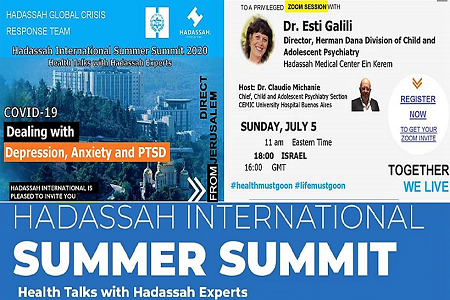
Under the auspices of Hadassah International, two mental health specialists from opposite ends of the world joined together for a July 5 webinar, organized in partnership with Hadassah Argentina, to talk about their professional and personal experiences dealing with the anxiety that the COVID-19 pandemic has generated.
“We are facing deep challenges in our practices as well as in our personal lives,” related Dr. Claudio Michanie, chief of the Child and Adolescent Psychiatry Section of the CEMIC University Hospital in Buenos Aires, Argentina. Dr. Esti Galili-Weisstub, director of the Herman Dana Division of Child and Adolescent Psychiatry at the Hadassah Medical Organization, echoed Dr. Michanie’s sentiment in expressing the uniqueness of counseling patients when the therapist is also immersed in the trauma of COVID-19. “It’s not as if you are secure and comfortable and you are offering your knowledge to your patients,” she said. Rather, she explained, the therapist shares the anxiety patients are experiencing from COVID-19’s threat to human survival.
Dr. Galili emphasized that we are in the heart of a traumatic event, and there are few answers. But she noted that most of us “have hope and that hope is very important for our ability to respond to the pandemic and to take care of others.”
Dr. Michanie described his country’s stress living in lockdown for over 100 days and how it has created serious gaps in mental health care. As he explained, because in-person consultations have not been possible, he and his colleagues have seen a worsening of symptoms in their patients with panic disorders and generalized anxieties, and an increase in psychiatric emergencies. Dr. Michanie reported also that CEMIC has witnessed a 40 percent increase in domestic violence against women. Children, he said, are exhibiting more self-harm and attempting suicide more often.
Personal protective equipment provides its own set of problems in allaying the fears of children, who are brought to the Emergency Room. Normally, Dr. Galili explained, a therapist will wear casual clothing when meeting with a child so as not to appear intimidating. With physicians needing to wear masks and face screens in the ER, they appear impersonal and frightening, which makes it difficult to evaluate children and gain their trust.
Inpatient and outpatient mental health care during the COVID-19 pandemic are fraught with their own sets of problems, Dr. Galili brought out. The inpatient adolescent unit at Hadassah had to be closed to visitors, adding to the level of stress. The social distancing that COVID-19 requires has forced out-patient group therapy to be conducted with smaller groups, which, Dr. Galili said, is not as effective for the teens.
In addition, one-on-one therapy has been curtailed, with therapists working from home. The value of the interpersonal experience of sitting in the same room with a patient cannot be discounted, Dr. Galili explained. “Telemedicine is not as good.”
While some children are receiving their therapy on Zoom, not all children have access to smartphones. Even if they do, these Zoom calls often take place in a noisy home environment, with other siblings running around. The doctor is also at home, sometimes with family members in view, so a setting for private, intimate therapy is elusive.
Dr. Galili also discussed COVID-19’s impact on hospital health care workers. As she explained, the Hadassah staff working in the COVID-19 outbreak units are under tremendous stress. At the end of a shift, they are simply too tired to pick up a phone and ask for help. Her solution was to put on the necessary personal protective gear and join them in their staff room. She then was able to ask the doctors and nurses if they wanted to talk. The staff members were very grateful for this face-to-face therapy, she said, and she was able to help them cope with an extremely stressful environment.
By the same token, Dr. Michanie emphasized that “this is a time to be extremely empathetic toward parents who are overwhelmed by their need to work while their children are home from school and require homeschooling.” Therapists, he recommended, “must help parents lower their expectations, to be less demanding of themselves and their children.”
Dr. Galili cautioned everyone that while we may think that watching the news extensively and absorbing a lot of information will calm us down, “it doesn’t work that way.” To help reduce the level of anxiety, Dr. Galili recommended that people engage in new activities or begin a project. She suggested dancing, listening to music, cooking, painting, knitting, or getting involved politically. “Learning something new,” she said, “opens channels of positivity in your psyche.”
Watch the full webinar here:
